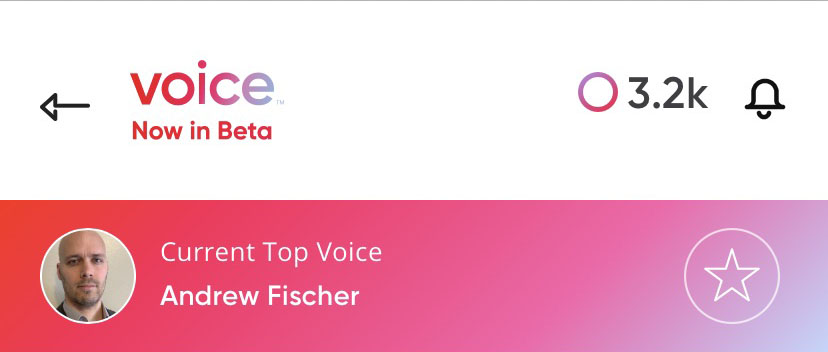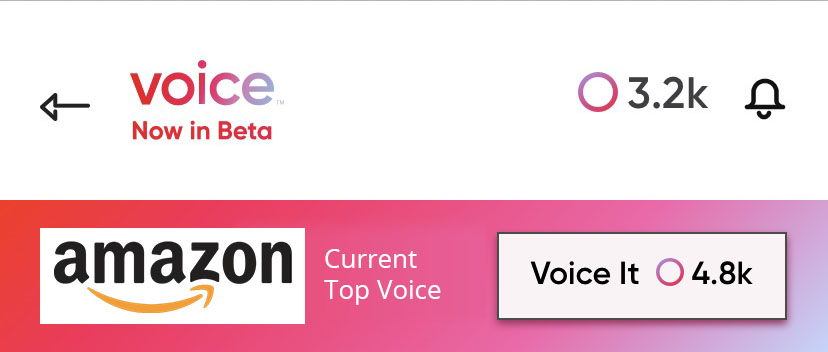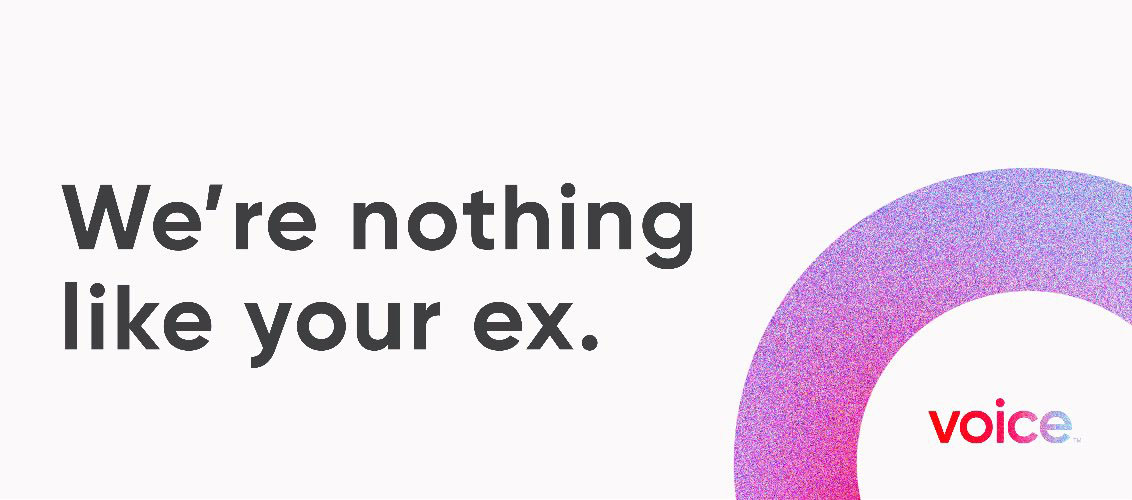Editor’s Note: This article was originally published on PopMalt. It is syndicated here in its entirety as A) I am the original author, and B) it relates specifically to the social media industry, one of many digital marketing areas in which we help our clients.
While many of us were either going on dates or wallowing in our loneliness this past Valentine’s Day, a groundbreaking new social media platform began to crack open its doors. Voice, the $150 million dollar social media network endeavor backed by the blockchain pioneers at Block.One, is now live for a select group of beta testers, and as the owner of a social media and digital marketing agency, I’m excited to have been invited to it.
How often do you have the chance to be a part of witnessing the future of social media before just about everybody else in the world?
Count me in.
To me, this is how I imagine it would have felt like being one of Mark Zuckerberg’s college classmates when he first launched Facebook in 2005. Except, college student Mark didn’t have a spare $150 million dollars to develop his prototype.
Upon openings its doors to the first wave of beta testers, I signed up immediately and introduced myself. I had several questions, given my profession, and before long, found myself being welcomed to the platform by Block.One’s very own CEO, Brendan Blumer. Brendan was kind enough to take the time to talk with me directly and answer many initial questions I had going into the beta.
Here are the main questions I had, along with Brendan’s answers as well as my own observations and speculations as Voice enters this high-competitive social media space.
1. What Does Such an Ambitious Social Media Platform Look Like, Big Picture?
For starters, Voice is based on the EOS blockchain. For those who haven’t quite caught up on your big-tech lingo in recent years, blockchain technology is what makes digital currencies possible, among many other uses (expanding by the day) outside of finance.
According to Wikipedia, a blockchain “is a growing list of records, called blocks, that are linked using cryptography. Each block contains a cryptographic hash of the previous block, a timestamp, and transaction data. By design, a blockchain is resistant to modification of the data.”
Still lost? That’s ok. Basically, Voice is built on the stuff of science fiction and is basically the same as the memory storing tree networks in James Cameron’s Avatar franchise.

Instead of just storing information in a standard database where new and changed data lives independently from one another, all of the data is linked together and grows upon each other as it is updated, changed, etc.
But I digress. You don’t have to be a blockchain enthusiast or Bitcoin miner to appreciate what Voice is doing.
Essentially, because of their infrastructure, Voice is opening doors that all other previous social media platforms don’t even have.
It’s difficult to speculate what this could all mean for the future of the platform and social media as a whole, but one thing is for certain; Voice is going to change the norm of what future generations expect in social media.
2. Which Current Social Platform is Voice Poised to Replace or Challenge?
On the question of where Voice fits in the current world of social media, Brenden said “We’re really focused on creating something different as opposed to replacing a specific platform. Required KYC and identity [verification] for example, already changes the dynamic greatly and may even limit the number of people that are interested in it, but should yield a very different experience and outcome.”
After using Voice for a few days, I’d agree that it doesn’t quite feel like a drop-in replacement for any current platform, which is a good thing. It feels similar to several, but the dynamics of earning (and spending) Voice tokens (more on those later) put it soundly in a league of its own in the area of user experience.
As Brendan mentioned, KYC, which stands for Know Your Customer, is something that immediately separates Voice from its bot and troll-prone predecessors. Voice is a platform for real people and has zero tolerance for bots and fake accounts. As such, they require identity verification for all individuals using the platform.
If you want an account, Voice needs to know that you are who you say you are. Be prepared to pull out your driver’s license or passport when signing up—much like becoming verified on Instagram or Twitter, except this goes for every user on the platform, not just celebrities.

3. How Will Privacy be Handled?
If you’ve had a social media account in recent years, you’re probably well aware that user privacy has become quite a hot topic.
Users are growing more and more wary of big tech knowing everything about them and the implications that having accounts on major websites may have on their privacy.
Will their data be sold?
Who will have it and how will it be used?
Brendan said this on the issue of privacy: “On Voice there are things you share, and things you don’t. The monetization of the platform isn’t predicated on accessing and soliciting private information that wasn’t intended for circulation.”
He also referenced Voice’s official privacy notice, which you can read here if you’re interested.
Worth noting is the phrase “accessing and soliciting private information that wasn’t intended for circulation.” Traditional social networks’ primary ad revenue comes from companies wanting to target people based on information that said social networks have collected on them over the years. i.e “People interested in knitting” or “People who are fans of the Chicago Bulls” (to greatly simplify the concept of interest-based targeting).

Since Voice’s monetization model is structured differently (more on this later), the platform won’t need your private information to make money—a breath of fresh air for many privacy-conscious users open to exploring new social media platforms.
4. Will Brands Be Given a “Voice” or Will it Be Limited to Individuals?
As the owner of multiple companies and as somebody who is heavily invested in social media marketing both for my own brands and for clients of mine, I was naturally curious about the potential for brands to benefit from this new platform.
What Brendan said in response to this question left me wide-eyed.
“Brands and companies will be able to eventually sign up. Unlike traditional [platforms] where they are able to advertise or promote content by paying the platform operator cash, brands marketing on Voice are intended to purchase Voice tokens from other users in order to have an influence beyond what they earn…”

If you didn’t quite catch that, Voice isn’t going to be the only one earning money when you use the platform. Which leads me to…
5. What Are Voice Tokens and Why Do You Want Them?
On Voice, you earn digital currency (backed by blockchain technology) called Voice Tokens when you create content that others engage with. There are many ways that users can engage with content (some old, some new exclusive to Voice), and those engagements now mean more than a quick rush of dopamine to the head. Now, likes, comments, etc. are as good as cash, in a sense.
Every new post on Voice has a leaderboard at the top called “Top Voice”, a proprietary system exclusive to Voice and not yet seen before on other platforms.
Well, except for maybe the way bidding works on eBay.
The way Top Voice works is that you (or anybody) can spend Voice Tokens to “Voice it” and become Top Voice on any given piece of content. If the same person remains Top Voice for 24 hours, they essentially “win” and are crowned the Winning Top Voice.

While bidding is open, every new Top Voice contender has to pay an increasingly higher price to claim that spot. And each time somebody does, that post gains traction in the algorithm and is promoted to more prominent positions on the site.
The best part? Your Voice Tokens are returned to you and then some when somebody outbids you, so you earn points by essentially “upvoting” content that is likely to continue to be appreciated by others. And becoming the Winning Top Voice will ultimately allow the winner some self-promotion on posts they win (this feature was not rolled out yet at the time of the beta launch, but speculation has already begun within the beta group for how brand logos will ultimately find their way into this covetable Top Voice spot on popular posts).
Where do brands come in? Well, here’s what Brendan said about Voice Tokens:
“Voice tokens are the platform currency that are used for all forms of engagement and promotion. Those that want more influence than they have earned will need to purchase them from other users who are willing to sell them.”
Since Brands will likely fall into the category of those who “want more influence than they have earned”, they will need to purchase that influence.
That means if you’re an influencer on Voice—or even just an everyday user who creates great content from time-to-time—you can sell your earned Voice Tokens for actual money.
We already spend a lot of time on social media.
Why not earn some cash while doing it?
6. What Will Advertising Look Like on Voice?
Ok, so brands can buy influence from users. Got it.
But will that come at a detriment to the user’s experience over time? Brendan and the team behind Voice doesn’t think so.
“On Voice, we’re focused on creating forms of content promotion that don’t come at a detriment to the user experience. “Voice it” is an example of this and will eventually afford the top Voice the top comment spot. Over time there will be more ways to spend tokens that increase content visibility and offer forms of unique engagement.”
I may be reading into that a bit, but it sounds to me like ads on the platform are going to done more along the lines of “promoted content” or even “sticky posts” that forum users may be familiar with.
Ad locations common to traditional social platforms may be non-existent on Voice, replaced instead with engaging content that better blends with the type of content people are already reading on the platform.
Will Brands be able to bid to become Top Voices on popular posts? While the feature is not currently available, it would almost feel like a miss if this isn’t already on Voice’s radar.

7. Will Voice Be Useful for People Already on Everything Else?
According to Brendan, when asked this question, “If [users are] looking to take back control over their information, earn from their content creation, and interact exclusively with real users, then yes.”
There will certainly be people who are going to stick to the platforms they’ve already amassed great influence on, and there will be others who use their influence to expand their influence to Voice.
And why wouldn’t they? By flipping traditional social media advertising monetization on its head, Voice is a platform made for users first and brands second.
8. With a Name Like “Voice”, Will Audio Play a Role in the Platform?
Brendan played his cards more closely to his chest when asked this question, but he did confirm that “audio and video are on the agenda.”
What exactly that means could be anyone’s guess.
Personally, I’d like to see advanced text to speech, voice identification, voice navigation, and voice narration throughout the platform. And of course, I fully anticipate Alexa, Google, and Siri to get in on the action.
The name “Voice” is at least a reference to “giving users a voice” in the metaphorical sense, but I’d love to see Voice stand out from the competition even more by running with the idea of “Voice” in all areas.
And video should go without saying. While native video uploads aren’t currently supported, YouTube and Vimeo embeds are both encouraged.
9. What Type of Content Will Do Well on Voice?
Personally, in the few days that I’ve been a Voice user, I’ve noticed a few early trends for different types of content that is doing well.
First of all, Voice is somewhat the anti-Twitter in the sense that all posts are required to be a minimum (yes minimum) of 160 characters. That means if you have something short and quippy to say, you can either keep it to yourself, save it for Twitter, or expound upon it.
The platform is built with quality in mind from the ground up, and Voice expects that principle to extend to the users and the content posted on the network too.
Long-form content aimed at a public audience tends to do well, but so does shorter content that invites users into a conversation—again, just don’t make it too short or the character limit gods will smite you.
Currently, you can follow—er listen to—other users, but there are no privacy settings for limiting specific people and groups of people to view your content. There may be plans to change this in the future, but for now, I expect the very personal posts currently popular on Facebook (updates on kids, pictures of you and bae out to dinner, etc.) to see less engagement on Voice than on other networks more focused on personal connections.
And of course, since Voice is still in beta, all of this may change as Voice continues to roll out new features and evolve as a platform.
Brendan himself said of the type of content that will do well on Voice: “That’s up to you and the rest of the users.”
10. How is Voice Going to Shake Up the Social Media Industry?
As I jumped into the platform last Friday and through the weekend, I found the experience to be a pleasant mix between surreal and awe.
Surreal because as I navigated the few pieces of content currently available on the platform within mere hours of the beta launch, I couldn’t help but shake the feeling that one day, most likely in the not-so-distant future, Voice would be the new social platform of choice for millions, tens of millions, and ultimately billions of users (I really do think they’ll pull this off).
And awe, because as somebody who’s somewhat of a futurist myself and has followed many highly-funded tech startups through the years, I realized that the exciting, albeit minimal version of the platform that I was currently experiencing was only the tip of a very big iceberg.
Brendan narrowed down a few key areas that will separate Voice from other platforms are:
- Transparency
- Verified user identity
- User value creation
- Alignment between the users and the Voice platform
In many ways, Voice is a platform by the people and for the people. It may not feel entirely different on the surface, but once you dig in and start using it, you just might find yourself feeling like you are a part of Voice and not just a user of Voice. And most importantly, you won’t feel like a product of Voice.

With Voice, users will directly benefit when the platform grows, so what are you waiting for?
Request access to the private beta here.
Once you get in, don’t forget to follow me.
If you represent a brand or company looking to grow your influence through social media, contact me through my digital marketing company NURV and let’s have a conversation.
And, last but not least, share this article and Voice with your friends so they can have a Voice too.
Are you looking to grow your brand’s influence through social media marketing? Are you interested in staying ahead of the curve by being an early adopter for new platforms like Voice?
We help position our clients for ongoing success in today’s ever-changing digital market. Contact us for a free digital marketing audit or to schedule a strategy session to learn how we can help your brand cut through the noise.


